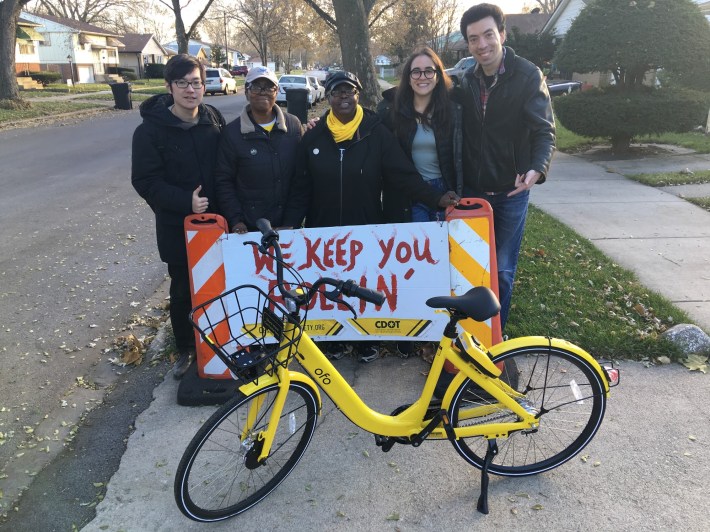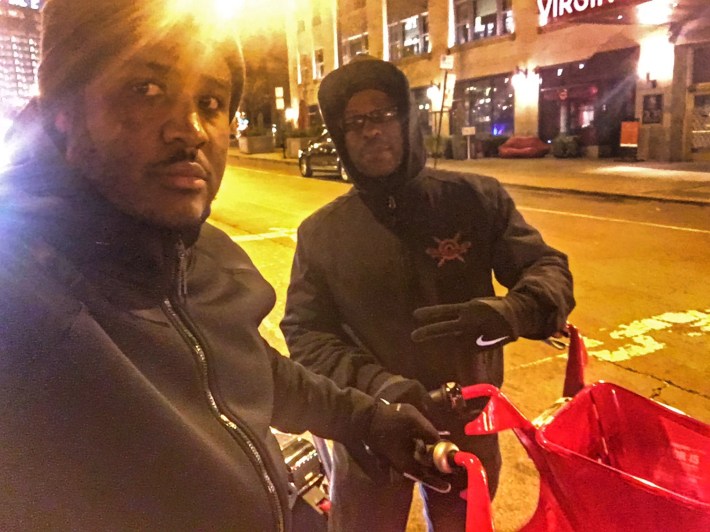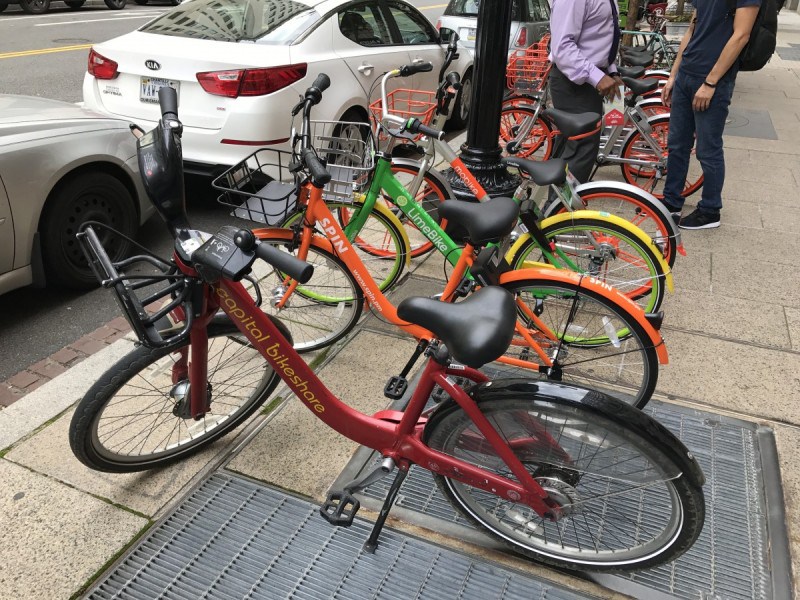Currently the city of Chicago is trying to decide if and how they should allow dockless bike-share (DoBi) providers to set up shop here. At November’s Mayor’s Pedestrian Advisory Council meeting, deputy Chicago Department of Transportation commissioner Sean Wiedel said the agency had recently met with representatives of Spin, a San Francisco-based dockless company, to discuss permitting issues, and that the company had also reached out to local bike nonprofits about contracting with it to maintain the cycles. “We expect to be meeting with dockless providers and other stakeholders in the coming months,” he said. Meanwhile, the Beijing-based DoBi company Ofo, and SF-based electrical-assist dockless bike-share firm Jump have delivered cycles to start "bike libraries" in the North Lawndale neighborhood and the Riverdale community (which includes Altgeld Gardens, Golden Gate and other enclaves.)
As the debate over whether we should roll out the red carpet for dockless technology heated up, I recently submitted a Freedom of Information Act request for CDOT emails regarding DoBi, in order to shed some light on the department’s decision process. The correspondence that the agency provided suggests that they’re looking at the issue with eyes wide open and proceeding with caution.
Dockless bike-share lets customers use a smartphone app to locate and check out bikes distributed around a city, and then lock them up right at their destination, with no need for the rental company to invest in expensive docking stations. The cheap price of renting the bikes, usually $1 per half-hour compared to $9.95 for a Divvy day pass, and the convenience of not having to end a trip at a station, can potentially attract more people to urban cycling. The flexibility of DoBi also makes it a possible solution for bringing shared bikes to outlying neighborhoods that don’t have Divvy stations in an era when federal funding for bike infrastructure may become scarce.

However, many of the CDOT emails involve cautionary tales about the potential pitfalls of dockless, and examples of shady behavior by DoBi operators. For example, an early September memo from department spokesman Mike Claffey to staffers who oversee the Divvy program shares a September 2 New York Times article about how the technology has caused problems in Chinese cities, including blocked sidewalks, bike theft, and vandalism, such as bikes being hung from trees, buried in construction sites and thrown in rivers and lakes.
“Funny read on chaos in China caused by dockless bike share, where there are 16 million (!!!) shared bikes!” Claffey writes. “Talk about a glut!” He notes that the article mentions a cease-and-desist order that New York City transportation officials issued this summer to Spin, the company CDOT has been in talks with, to halt Spin’s plans for an un-permitted demonstration project in Queens.
Another email from the FOIA response includes correspondence from city of San Francisco transportation planner Heath Maddox outlining how Spin illegally launched an un-permitted pilot program in SF earlier this year, despite a letter the city had sent to dockless operators informing them that permits were required. After the illegal fleet was highlighted in the local press, “Spin offered to ‘smooth things over’ by pulling their bikes and focusing on their permit application,” Maddox wrote, characterizing the company’s previous behavior as “disrespectful to the city.”

Maddox added that before Spin took their bikes off the street, he downloaded their app and tried one out himself. He noted that, of the eight dockless bikes at the rack where he got his cycle, one was missing a wheel, one’s rack and solar panel had been ripped off, and a third had its “flimsy headlight hanging from its exposed wiring.” He added that Spin’s behavior seemed to be a case of a North American Bike Share Association member violating the NABSA code of conduct, and argued that NABSA should develop minimum bike-share equipment standards.
Interestingly, another article circulated among CDOT staffers was a Spin blog post from August calling out other companies for the same tactics. “Recently, we’ve seen rogue (often foreign) companies attempt covert deployments in Miami and San Diego, and engaging in behavior that is disruptive to local communities," the post stated. The linked articles refer to cycles from SF-based LimeBike illegally showing up on the streets of Miami Beach, and Ofo’s un-permitted launch of a fleet on the University of California at San Diego campus. “As proud members of the the North American Bikeshare Asocciation(NABSA), we call on all bikeshare companies, station or stationless, foreign or local, to subscribe to these same core values,” the Spin post stated.
In another an October email from the CDOT FOIA response, Divvy deputy general manager Michael Critzon discussed how Transit App, which includes info on various modes of transportation, including traditional bike-share, was adding dockless bike locations to the platform. “Kind of a bummer,” Critzon wrote.

Similarly, in an October 18 email exchange between Wiedel and Luc Sabbatini, CEO of Montreal-based PSBS Urban Solutions, which manufactures the bikes used by Divvy and other many other docked systems around the country, the men express their displeasure with a recent Forbes article titled “Chicago, Once a Bikeshare Innovator, Squeamish About the Next Level.” The piece, by local journalist Jeff McMahon, argued that the city is being overly timid about adopting DoBi, stating that “Chicago's heavy bikes and anchored docks seem old-fangled” while dockless cycles are “state of the art.”
Sabbatini writes that he’s “really surprised at all the lobbying the dockless folks seem to deliver everywhere… nobody talks about secure bike/quality of bike/issues with their app/bikes left all over the place and vandalism.” Wiedel replies, “Agree that it's overblown. [The companies are] all working with lobbyists to get out the message they want, accurate or not.”
Sabbatini also sent Wiedel an article from China Money that he said makes it clear that the dockless model isn't sustainable, since venture capital is necessary to maintain the low rental prices. “Mobike currently does not have a clear method to monetize, and we are relying on investors’ money,” Wang Xiaofeng, CEO at Mobike told reporters, according to the China Money piece. “To attract customers, bike sharing companies charge very low rental fees… We will aim to gain market share as much as possible first, and then discuss how to become profitable."
The FOIA response also includes September correspondence between Wiedel and Spin employees, setting up the late September meeting. Spin’s government relations manager Anthony Desnick tells Wiedel the company wants to work with CDOT “to bring station-free bike-share to Chicago.”
In addition, CDOT provided a September 27 email from 1st Ward staffer Jerry Mondujano to Wiedel informing him that Alderman Joe Moreno recently met with Spin head of marketing James Moore to discuss a possible rollout of DoBi in the ward, which includes parts of bike-friendly Wicker Park, Bucktown, and Logan Square.
There’s also an email from Alex Wilson, director of the Humboldt Park-based bike education center West Town Bikes, notifying Wiedel that West Town is in talks with Spin about potentially contracting with the company to maintain a future Chicago DoBi fleet. “I’m interested in seeing if a youth training program can be leveraged as well,” Wilson writes. “I’d appreciate any insights you may have.”
So the FOIA response suggests that CDOT is carefully considering all the possible benefits and drawbacks of dockless bike-share launching in Chicago, although some DoBi proponents would argue that city officials are being overly cautious. You can make your voice heard on the subject at the upcoming Mayor’s Bicycle Advisory Council meeting this Wednesday, December 13, 3-4:30 p.m. at City Hall, 121 North LaSalle, Room 1103.






